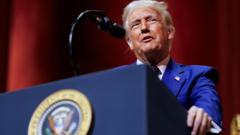In a significant political maneuver, Sinn Féin leadership has opted to forgo the annual St Patrick's Day events held at the White House, a decision that could impact its relationship with American political figures and the Irish diaspora. Traditionally, Northern Ireland's first and deputy first ministers attend these celebrations, fostering ties with the U.S. However, following Donald Trump's recent provocative comments regarding Ukraine and Palestine, Sinn Féin's stance appears increasingly bold amid international criticism of Trump’s policies.
Sinn Féin Takes Bold Stance by Skipping White House St Patrick's Day Celebrations

Sinn Féin Takes Bold Stance by Skipping White House St Patrick's Day Celebrations
Sinn Féin's decision to boycott St Patrick's Day festivities in Washington marks a notable shift in Northern Ireland's political landscape as tensions rise over Donald Trump's recent controversial remarks.
The recent backlash from Trump’s suggestion to convert Gaza into a tourist destination, coupled with his derogatory remarks about Ukrainian President Volodymyr Zelensky, has created an atmosphere of public outrage. Sinn Féin’s boycott serves as a response to these developments and aligns with the sentiments of many who are discontented with Trump's approach.
Sinn Féin leaders Michelle O'Neill and Mary Lou McDonald have opted to announce their boycott from Dublin, sending a clear message to their political adversaries. Meanwhile, Deputy First Minister Emma Little-Pengelly may still represent Northern Ireland in Washington, but the absence of both Sinn Féin ministers could signal a deeper political strategy aimed at galvanizing their base, especially amid rising tensions within the unionist community.
With eight Irish ministers, including Taoiseach Micheál Martin, traveling to the U.S. for St Patrick's Day, the dynamics of representation will be closely watched. Sinn Féin's refusal to engage with the White House could risk alienating supporters, but it also demonstrates a commitment to stand against policies perceived to be unjust. The political implications of this gamble will unfold in the coming weeks as the discourse around Northern Ireland’s representation continues.
Sinn Féin leaders Michelle O'Neill and Mary Lou McDonald have opted to announce their boycott from Dublin, sending a clear message to their political adversaries. Meanwhile, Deputy First Minister Emma Little-Pengelly may still represent Northern Ireland in Washington, but the absence of both Sinn Féin ministers could signal a deeper political strategy aimed at galvanizing their base, especially amid rising tensions within the unionist community.
With eight Irish ministers, including Taoiseach Micheál Martin, traveling to the U.S. for St Patrick's Day, the dynamics of representation will be closely watched. Sinn Féin's refusal to engage with the White House could risk alienating supporters, but it also demonstrates a commitment to stand against policies perceived to be unjust. The political implications of this gamble will unfold in the coming weeks as the discourse around Northern Ireland’s representation continues.




















